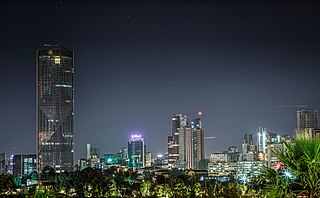
Addis Ababa is the capital and largest city of Ethiopia. In the 2007 census, the city's population was estimated to be 2,739,551 inhabitants. Addis Ababa is a highly developed and important cultural, artistic, financial and administrative center of Ethiopia. It is widely known as one of Africa's major capitals.

Addis Ababa University (AAU) is a national university located in Addis Ababa, Ethiopia. It is the oldest university in Ethiopia. AAU has thirteen campuses. Twelve of these are situated in Addis Ababa, and one is located in Bishoftu, about 45 kilometres (28 mi) away. AAU has several associated research institutions including the Institute of Ethiopian Studies. The Ministry of Education admits qualified students to AAU based on their score on the Ethiopian University Entrance Examination (EUEE).

The 1962 African Cup of Nations was the third edition of the Africa Cup of Nations, the football championship of Africa (CAF). It was hosted by Ethiopia. Nine countries entered the competition, including the reigning champions Egypt, meaning for the first time a qualification tournament was required. The finals only included four teams. Egypt, as holders, and Ethiopia as hosts, qualified automatically meaning each needed to play only one game to reach the final. Ethiopia won the tournament for the first time, defeating UAR 4–2, after extra time in the final.

Addis Ababa Stadium is a multi-purpose stadium in Addis Ababa, Ethiopia. It is used mostly for football matches although it also has athletics facilities. The stadium has a capacity of 20,000 people.

Jimma University (JU) is a public research university located in Jimma, Oromia Region, Ethiopia. It is recognized as the leading national university, as ranked first by the Federal Ministry of Education for four successive years (2009–2012). The establishment of Jimma university dates back to 1952 when Jimma College of Agriculture was founded. The university got its current name in December 1999 following the amalgamation of Jimma College of Agriculture and Jimma Institute of Health Sciences.
Fiche is a town in central Ethiopia. It is the administrative centre of the Northern Shewa Zone in Oromia. It's located about three kilometers from the main Addis Ababa-Debre Marqos road, Fiche has a latitude and longitude of 9°48′N38°44′E and an elevation between 2,738 and 2,782 metres above sea level.

The National Museum of Ethiopia (NME), also referred to as the Ethiopian National Museum, is a national museum in Ethiopia. It is located in the capital, Addis Ababa, near the Addis Ababa University's graduate school.
Sendafa is a town and separate woreda in Oromia Region, Ethiopia. Its name is taken from the Oromo name for a kind of thick, jointed grass or reed which grows in swampy areas. Located in the Oromia Special Zone Surrounding Finfinne of the Oromia Region, Sendafa has a latitude and longitude of 9°09′N39°02′E with an elevation of 2514 meters above sea level. The town lies on the paved Addis Ababa - Adigrat highway, some 38 kilometers north of the capital.

St. Mary's University is an private higher education institution located in the capital Addis Ababa, Ethiopia. After fifteen years of service as a college first and a university college since 2008, it earned university status from the Ethiopian Ministry of Education in September 2013.
Holeta is a town in the special zone of Oromia Region, Ethiopia. It has a latitude and longitude of 9°3′N38°30′E and an altitude of 2391 meters above sea level.

Health in Ethiopia has improved markedly since the early 2000s, with government leadership playing a key role in mobilizing resources and ensuring that they are used effectively. A central feature of the sector is the priority given to the Health Extension Programme, which delivers cost-effective basic services that enhance equity and provide care to millions of women, men and children. The development and delivery of the Health Extension Program, and its lasting success, is an example of how a low-income country can still improve access to health services with creativity and dedication.

Meskel Square is a public square in the city of Addis Ababa, Ethiopia. It is often a site for Ethiopian Orthodox Tewahedo Church gatherings or for demonstrations and festivals, notably, the Meskel Festival from which it takes its name.
The Ethiopian Police University College Formerly Called Aba Dina Police College is a public institution of higher education in Ethiopia dedicated to training police officers. Its main campus is located in Sendafa, a town 38 kilometers north of Addis Ababa.
St. Paul's Hospital Millennium Medical College is health sciences teaching institution at St. Paul Hospital, Addis Ababa Ethiopia.
Tselemt is one of the woredas in the Amhara Region of Ethiopia. Located at the northeastern point of the Semien Gondar Zone, Tselemt is bordered on the south by Beyeda, on the southwest by Jan Amora, on the west by Addi Arkay, and on the north and east by the Tigray Region. Tselemt was part of Addi Arkay woreda.

The Sheraton Addis is an international hotel located in Addis Ababa, Ethiopia. It is part of Marriott's Luxury Collection. It has 293 rooms, as well as a number of villas.
Qoshee also known as Koshe is a large open landfill which receives rubbish and waste from Addis Ababa, the capital of Ethiopia. The name means "dirty" in Amharic.

Addis Ababa Science and Technology University, or AASTU, is a higher education institute in Addis Ababa, Ethiopia. The main campus is located in the Akaky Kaliti subcity, Kilinto area around Tulu dimtu.

The Africa Centres for Disease Control and Prevention is a public health agency of the African Union to support the public health initiatives of member states and strengthen the capacity of their health institutions to deal with disease threats. The idea of an African CDC was proposed by the government of Ethiopia in 2013, during a TB/HIV special summit in Abuja, Nigeria. From 2013 to 2016, the modalities and statute of Africa CDC were developed, and the specialized agency was officially launched in January 2017.












